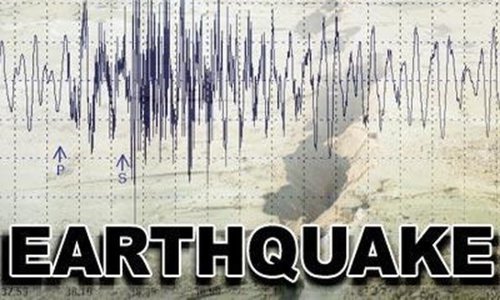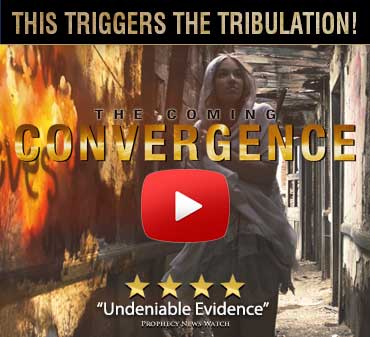Over 250 Earthquakes In Idaho In 9 Days Leads To More Super Volcano Fears
 By Mac Slavo/SHTFplan.com September 12, 2017
Share this article:
By Mac Slavo/SHTFplan.com September 12, 2017
Share this article:
An earthquake swarm in south eastern Idaho is rattling windows
across parts of the state and Wyoming and Utah. There have now been
over 260 earthquakes since September 2, in the Soda Springs area and
many have been over a magnitude of four or even higher on the scale.
The
earthquake swarm in Southeast Idaho looked like it might be ending or
at least slowing down on Thursday and Friday. But then Saturday arrived
and by the day's end, 19 quakes had struck.
There
have been 34 more temblors so far Sunday, bringing the earthquake total
since the swarm began on Sept. 2 to 204 quakes. All of the quakes have
occurred in the Caribou County area east, southeast and northeast of
Soda Springs.
While many believe California and
the West Coast are ripe for a huge earthquake, the heartland is often
forgotten and these earthquakes are being swept under the rug and
largely unimportant to the public at large.
While all eyes are on California's San Andreas Fault
because of the density of the human population there, many haven't
noticed Idaho's swarm and the area which is highly active right now.
Earthquake
experts claim that the swarm in Idaho could end in a worst case
scenario: a 7-magnitude quake that would reduce some buildings and homes
to rubble and kill dozens or more - but the chances of that are
incredibly small.
Dr. David Pearson, an Idaho
State University geologist who studies earthquakes, said scientists who
have researched some of the faults in Southeast Idaho have concluded
that the 7.0 quake is possible at some point in the region's future, but
the current earthquake swarm is not necessarily an indication that it
will occur anytime soon.
Pearson said the
faults in Southeast Idaho that produce earthquakes have not been
extensively studied and this makes it difficult to determine when a
destructive 7.0 earthquake could occur.
The
current earthquake swarm began on the night of Sept. 2 when 34 quakes
occurred. Those were followed by another 34 quakes last Sunday, 28 on
Monday, 20 on Tuesday, 25 on Wednesday, five on Thursday, five on
Friday, 19 on Saturday and 34 so far Sunday.
There
was even a 4.5 magnitude quake in that area this morning, and people
have reported feeling that quake as far away as Jackson, Wyoming. All
260 plus of the quakes were reported by University of Utah Seismograph
Stations.
Thus far, the most powerful temblor in the swarm was the
second quake to occur. It was a 5.3 magnitude earthquake and struck at
5:56 p.m. September 2.
Authorities say it's
been years since Southeast Idaho experienced a quake of 5.0 magnitude or
greater. Such quakes can cause damage to houses and other buildings,
but fortunately, this was not the case. By comparison, a 7.0 magnitude
quake would be at least 50 times bigger than the 5.3 magnitude temblor
that hit Southeast Idaho last weekend.
The U.S.
Geological Survey said that a 7.0 magnitude quake will inflict
"considerable damage" to ordinary houses and buildings and will cause
such structures to partially collapse. Such temblors will also cause
chimneys, factory smoke stacks and walls to collapse, according to the
USGA.
Of course, the swarm of earthquakes in
Idaho isn't limiting fears to a larger local quake. Many are afraid
that these swarms could trigger the Yellowstone super volcano's
eruption, as the caldera just northeast of the Soda Springs area, a mere
170 miles away.
While it has been thousands
of years since the last eruption, some seismologists are concerned the
recent swarm of earthquakes may be sending warning signs the
supervolcano is ready to explode once again.
"When
a volcano starts 'acting up' prior to an eruption, one of the typical
signs is increased seismicity," research professor at University of Utah
Jamie Farrell told Newsweek. Should the Yellowstone supervolcano erupt,
thousands of people would die instantly from the explosion.
While an earthquake in Califonia could devastate the West
Coast, a Yellowstone eruption has the potential to be a cautastrophic
world wide event. Soda Springs, Idaho's proximity to Yellowstone is
hardly comforting.
In the event of a full-scale
eruption of Yellowstone, virtually the entire northwest United States
will be completely destroyed.
Basically
everything within a 100 mile radius would be immediately killed, Salt
Lake City would literally be toast, and almost everyone and everything
in Denver would be dead in short order.
Further
away, volcanic ash would rain down continually for weeks. Those
foolish enough to step outside would quickly discover that the ash turns
into a substance similar to cement in the lungs, and many would die
from suffocation.
The amount of volcanic ash
released by Yellowstone would be almost unimaginable. In fact, it has
been estimated that a full-blown eruption would dump a layer of volcanic
ash that is at least 10 feet deep up to 1,000 miles away.
Food
production in America would be almost totally wiped out, and the
"volcanic winter" that would result from a Yellowstone eruption would
dramatically cool the planet. Some have projected that global
temperatures would decline by up to 20 degrees.
In
the end, the death, famine and destruction that we would experience
would be vastly greater than anything that we have ever seen in the
history of western civilization.
Originally published at SHFTplan.com - reposted with permission.

No comments:
Post a Comment